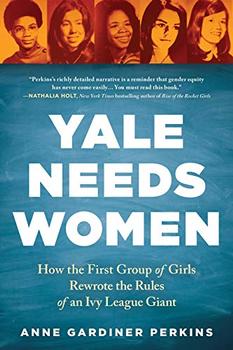Summary | Excerpt | Reading Guide | Discuss | Reviews | Beyond the Book | Readalikes | Genres & Themes | Author Bio
How the First Group of Girls Rewrote the Rules of an Ivy League Giant

Critics' Opinion:
Readers' Opinion:
First Published:
Sep 2019, 400 pages
Paperback:
Jul 2021, 400 pages
 Book Reviewed by:
Book Reviewed by:
BookBrowse First Impression Reviewers
Buy This Book
Brewster was hardly alone in his stance. America's most elite colleges had long maintained their reputation not just by the types of students they let in but by those they kept out: Jews, blacks, working-class kids—and women. Even after the wave of coeducation that followed the Civil War, upping the proportion of coed campuses from 25 percent before the war to 60 percent by 1890, the vast majority of top-tier colleges and universities in the United States stayed all male. Coeducation was solely a symptom of financial weakness, opined Harvard president Charles Eliot in 1873. The colleges that could afford to turn down women's tuitions—America's oldest and most prestigious—would continue to do so.
Nearly a century later, President Eliot's prediction held true, and in 1968, the list of U.S. colleges that still banned women undergraduates reads like an academic who's who: Amherst, Boston College, Bowdoin, Brown, Carnegie Mellon, Claremont McKenna, Colgate, Columbia, Dartmouth, Davidson, Duke, Fordham, Georgetown, Hamilton, Harvard, Haverford, Holy Cross, Johns Hopkins, Kenyon, Lafayette, Lehigh, Notre Dame, Penn, Princeton, Rutgers, Sewanee, Trinity, Tufts, Tulane, Union, UVA, Washington and Lee, Wesleyan, West Point and the other military academies, Williams, and—of course—Yale. A few, like Harvard and Brown, had created sister schools that kept the women nearby without putting them on equal terms with men, but none admitted women to the same college that the men attended. "In the minds of many," observed the Educational Record, "'all-male' education has become synonymous with 'prestige' education."
That status quo was just fine with Brewster, and unless he changed his position on the matter, Yale would stay just as it was. Brewster's power at Yale ran unfettered by the constraints that frustrated other campus presidents. He was not just a member of the Corporation, Yale's board of trustees, but its president, and "the faculty adored him," observed one senior professor. Brewster had raised their salaries and strengthened their reputation, and the glow from Brewster's accolades shone on all of them. Nonetheless, even Kingman Brewster could not always shape the world as he wished to.
The events of the spring of 1968 had shaken him. Martin Luther King Jr.'s assassination in April had struck particularly hard, for here was a man whose hand Brewster had clasped when, as one of the first acts of his presidency, he had awarded King an honorary degree. That same month, students at Trinity College, just forty miles up the road from Yale, had held a group of trustees hostage until Trinity acted on a long-stalled student demand for a scholarship fund for black and other disadvantaged students. A larger protest at Columbia three weeks later ended with more than two hundred students injured and seven hundred arrested.
Over the summer of 1968, Brewster retreated with his family to their waterfront home on Martha's Vineyard, where he spent his days in Bermuda shorts and sneakers, sailing and talking with friends and presiding over the grill at evening cookouts. And there, pecking out the words with two fingers on his typewriter, Brewster wrote the initial draft of his annual presidential report, his statement of Yale's accomplishments in the year just passed and the goals for the year to come. As he looked ahead to the fall of 1968, Brewster set forth two central questions: How much say should students have in university governance? What was the university's responsibility to the New Haven neighborhoods that surrounded it? Brewster typed out his answers, which in turn became his priorities for the year. His report was silent entirely, however, on the possibility of coeducation.
The summer ticked away, and as it did, the twine that held the nation together continued to unravel. In June, Bobby Kennedy was assassinated. In August, Chicago police assaulted protestors at the Democratic National Convention. And in the background was the constant drumbeat of the Vietnam War, where U.S. troop levels had surpassed half a million. The growing women's movement would unsettle the givens of Brewster's life still further, but in the summer of 1968, it was just gaining its footing. NOW, the National Organization for Women, was only two years old. Consciousness-raising groups had just started meeting in women's living rooms and kitchens. Most Americans did not yet grasp the extent of the discrimination against women in education, employment, and the law. Aside from Betty Friedan's The Feminine Mystique, the major works of second-wave feminism were yet to be written.
Excerpted from Yale Needs Women: How the First Group of Girls Rewrote the Rules of an Ivy League Giant by Anne Gardiner Perkins. © 2019 by Anne Gardiner Perkins. Used with permission of the publisher, Sourcebooks. All rights reserved.





The Funeral Cryer by Wenyan Lu
Debut novelist Wenyan Lu brings us this witty yet profound story about one woman's midlife reawakening in contemporary rural China.
Your guide toexceptional books
BookBrowse seeks out and recommends the best in contemporary fiction and nonfiction—books that not only engage and entertain but also deepen our understanding of ourselves and the world around us.